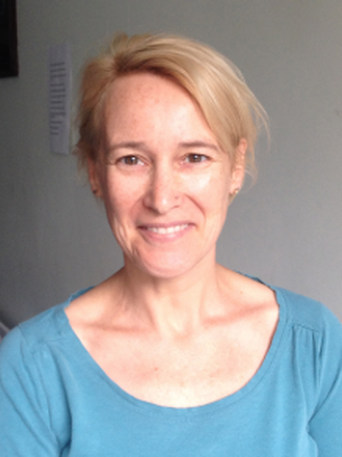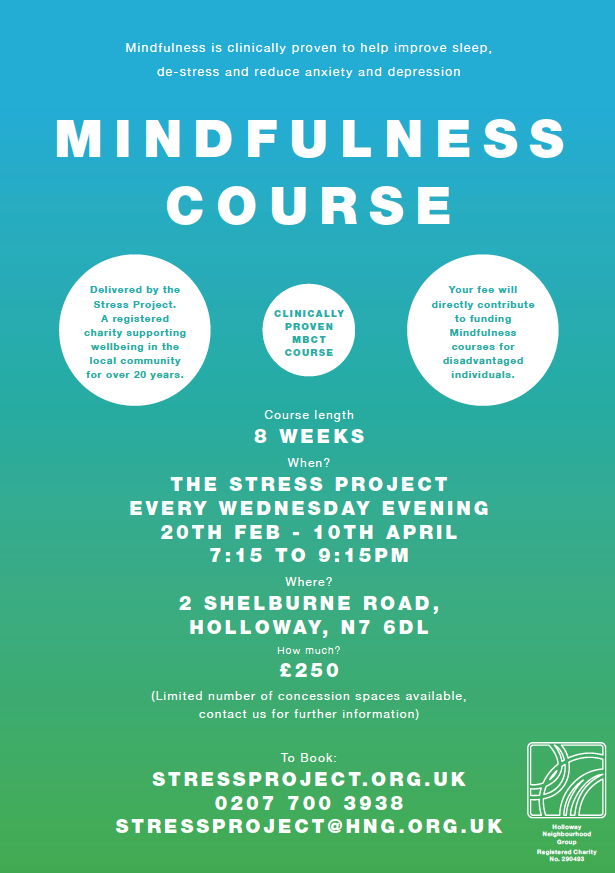| Anisha, one of our volunteers, follows up her chat with Mindfulness teacher Philip, by interviewing our Chief Executive - Lucy. The conversation covers a range of topics including why we run mindfulness services in Islington & the difficulties of fundraising for community organisations. Anisha: ‘How did you get into The Stress project?’ Lucy: ‘I’ve worked in the charity sector for 25 years, typically with small local charities in community development and mental health. I already knew about Holloway Neighbourhood Group as I lived fairly locally so when I saw the job opening, I thought I’d give it a go! I started in 2012 and it’s the longest I’ve stayed in any job. Normally I would move on quicker, but I love working with the team here. I really enjoy the mix of activities you get to do at a small organisation and I get to meet a lot of people that the project supports. For example, one day I will be covering reception or cleaning out the gutter and the next I will be doing wider business planning. Working at a big organisation can often make you forget who and what you’re doing it for. It’s nice to meet people who remind you why you’re there.’ Anisha: ‘What do you see as the long-term ambitions of The Stress Project?’ Lucy: ‘Most charities struggle because of funding. The government doesn’t have enough money, charitable trusts are heavily over-subscribed and individuals don’t have spare money to pay for services. For the last 3 years, Islington council has been funding 30-40 charitable organisations and this includes The Stress Project and that’s been great. Yet we wanted to go even further because mental health is such an important issue for Islington. In our borough, 30,000 adults experience depression or anxiety disorder in any one week. We wanted to test a model that incorporates Islington’s unique characteristic where the very rich and the very poor live side by side. People who have a social conscious, mental health issues and money can subsidise for other people who can’t afford the courses normally. This is the model we are applying to our mindfulness based cognitive therapy course. We started with mindfulness as we know this has a broad appeal, but our ambition is to bring this model to other therapies as well. Loneliness is very important for us. A study by Holt-Lunstad showed that loneliness, living alone and poor social connections are as bad for your health as smoking 15 cigarettes a day – it can even be worse than obesity.’ Anisha: ‘What challenges have you had to overcome since you’ve joined?’ Lucy: ‘The main issue was funding. We made the controversial decision a while back to sell the building and lease it back to pay off debts. Now, we are trying to earn money through fundraising and renting out our buildings. The Old Fire Station has become a vibrant and diverse community centre. We are not just earning income from it, it’s become a hub where everyone can drop in, find out what’s going on and make friends. Every borough has its own take on community centres (which interestingly used to be called community anchors) and the diversity of Islington is what makes it so special. We are aiming to grow user-led services where people have a say in how activities are run and how skills are shared.’ Anisha: ‘How can we see the impact of The Stress Project on the community?’ Lucy: ‘We have different measures for our low-cost counselling and therapy sessions which have revealed that 6 months after completing a mindfulness course, 85% of participants said that they are now less likely to worry or feel anxious, and 100% said they are better able to cope with stress. 71% of people undertaking a programme of counselling or complementary therapies report significant improvements in their mental health. We like to see The Stress Project as the backbone to the community. Some people will come in every week for years while others will only come in when they are feeling unwell. Quite a lot of people who use our services end up volunteering with us and one-on-one interviews reveal that people have felt listened to and felt a sense of belonging. We have such amazing volunteers here.’ You can sign up for the latest mindfulness course here. |
|
0 Comments
Your comment will be posted after it is approved.
Leave a Reply. |
Archives
January 2024
Categories |



 RSS Feed
RSS Feed